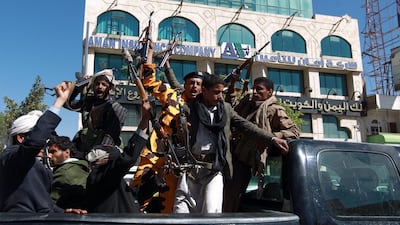Iran is sabotaging UN-led efforts to resolve the war in Yemen, an adviser to President Abdrabu Mansur Hadi said after a delegation from the Houthi rebels failed to show up for talks in Geneva.
“Iran is behind all the problems that are occurring in Geneva and Yemen. The Houthis’ ideology, activities in Yemen are Iranian,” said Mohammed Mousa Al Amiri, who is part of the government delegation that travelled to the Swiss city for negotiations scheduled for Thursday.
The talks were postponed until Friday after the Houthi delegation refused leave Sanaa, the rebel-held Yemeni capital, insisting on a series of last-minute demands. The UN said late on Thursday that talks would not be held on Friday either.
Mr Al Amiri said the rebels were a small part of the Iran’s “ruthless influence” in the region, and would travel to Geneva only when their conditions were met.
"Their demands include a private plane that will transport injured rebels — we are not aware of who they are. They could be Iranian or foreign fighters, they could be individuals who are fighting against the people of Yemen," he told The National.
The UN-mediated talks in Geneva would be the first public meetings involving government and rebels delegations since 2016, when 108 days of negotiations in Kuwait failed to reach agreement on power-sharing. Yemen’s humanitarian and economic situation has deteriorated in the two years since.
“The Houthis are not serious about finding peace, they don’t want peace. They are a sectarian and racist group that doesn’t want to participate in talks or collaborate with anyone," Mr Al Amiri said.
“We are here in Geneva to find peace, we are reaching out our hand to send a message to the world that we want to end the crisis in Yemen,” he said.
_______________
Read more:
Unravelling the diplomatic steps needed for peace in Yemen
US Centcom chief visits Yemen in warning to Iran
_______________
More than 10,000 people have been killed and millions displaced since the Yemen conflict began in 2015. The UN says more than three quarters of the population, or 22 million people, are in need of aid, most of which is shipped through the rebel-held port of Hodeidah on the Red Sea coast.
Mr Al Amiri said the fate of Hodeidah and the release of thousands of prisoners were the top priorities for government negotiators. The government fears the rebels' grip on the port threatens the only lifeline for millions facing starvation.
“We are representing the state of Yemen, we need to find a solution to stop innocent people from being killed,” Mr Al Amiri said.
A government campaign to retake Hodeidah city and its port was suspended earlier this year to allow the UN special envoy for Yemen, Martin Griffiths, to negotiate a solution and avert a full-scale assault that would have endangered civilian lives.
Government forces and the allied Saudi-led military coalition say the rebels must hand over the port and withdraw unconditionally from Hodeidah, but the rebels have so far agreed only to hand over control of the port to the UN.
The coalition intervened in the Yemen war in March 2015 at the request of Mr Hadi's government to push back the rebels after they took control of the capital Sanaa. It has helped the government gain control of large areas of southern Yemen, including the port city of Aden where the government is now based.
The United Nations is urging the government and the rebels to work towards a deal to end the war, remove foreign forces from Yemen, and establish a national unity government.


